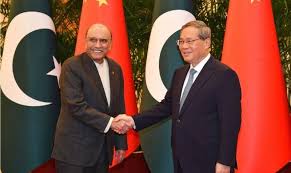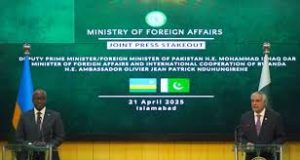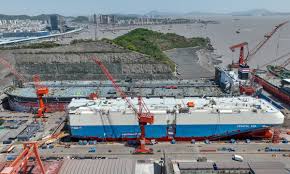2023 in EU economic policy: The year Germany went French – and back

Brussels: Faced with the fear of deindustrialisation, Germany sought to adopt a French-style industrial policy in 2023, including massive subsidies and protectionist ‘Buy European’ clauses – but was caught up by its constraints sooner than expected.
Before 2023 even began, Germany’s Economy Minister Robert Habeck (Greens) rightly predicted what would be dominating the year’s economic policy agenda.
“The next year will definitely be dominated by industrial policy,” he said at an industrial conference in November 2022.
Berlin and Brussels say they are ready to respond to the growing global challenge posed by dedicated industrial policies now favoured by major powers, like America’s Inflation Reduction Act.
Habeck knew that 2023 will be an uphill battle as the ‘German business model’ had come into question as cheap Russian gas, on which many producers relied, was no longer available as it was used as a powerful weapon by the Russian president.
With the advantage of cheap gas gone, the last nuclear power plants being shut down, and actually not-so-great conditions for renewable energy, many in Germany realised that keeping every industry in the country, particularly energy-intensive basic industries such as steel or chemicals, will be a difficult task – which may not even be worth it.
Not all energy-intensive industries will be competitive in Germany and might therefore not be worth subsidising with a cheaper electricity price, experts say, warning that such a subsidy scheme could be a waste of money.
But Habeck was ready to fight, giving the state a much more active role than what was previously known in the traditionally ‘ordoliberal’ country. “Those who believe that we will let Germany fall apart as an industrial site did not take into account the German industry,” he said.
It was also a message to China, the US and others, who tried to lure German and European companies to built production sites on their soil rather than in Europe, including by using massive subsidies.
US Deputy Treasury Secretary Wally Adeyemo, speaking in Berlin on Tuesday (31 October), defended the Inflation Reduction Act against criticism from the EU, calling upon European countries to adopt similar policies.
As a response, Habeck was willing to put some serious money on the table to compete with the US’s Inflation Reduction Act (IRA) and Chinese industrial policy.
While the European Commission, notably Commission President Ursula von der Leyen and Internal Market Commissioner Thierry Breton, shared much of Habeck’s ambition, they would have liked to see this being done at the EU level rather than each country individually.
European Commission President Ursula von der Leyen presented the Green Deal Industrial Plan on Wednesday (1 February) in an effort by the EU to keep up with a worldwide race in subsidy schemes for green industries.
This has kicked off a debate that would dominate much of spring and summer 2023, deciding on whether this should be done at the European level or within each member state, which many feared could give rich and large nations – like Germany – a clear advantage.
Ultimately, however, the Commission had to give in to its most powerful member state, and gave up the idea of new debt at the EU level to finance a subsidy push.
Joint borrowing is currently not an option to help member states finance the green transition, Internal Market Commissioner Thierry Breton said on Monday (13 March), marking a shift from previous calls for ‘mutualised tools’ at the European level.
Instead, despite the warnings of Competition chief Margrethe Vestager, the Commission opened the floodgates for national subsidies, through a temporary scheme that would allow EU countries to ‘match’ foreign subsidies with their own offers.
And, as it soon became clear, the warnings about Germany’s advantage in this subsidy race were warranted, as it was able to spend nearly as much on state aid as the rest of the member states combined.
Germany is the number-one beneficiary of the relaxation of state aid rules, having received almost half of the total state aid approved since February 2022, according to fresh data from the European Commission – deepening concerns over market fragmentation.
For a while, the EU Commission had talked of a “structural remedy” against this imbalance in the form of a European Sovereignty Fund.
But when the Commission finally presented a review of the EU’s long-term finances this summer, what was left of the ‘Europe Sovereignty Fund’ was a disappointment: A ‘Strategic Technologies for Europe Platform’ (STEP) with a financial firepower of only €10 billion was proposed – and as negotiations among member states are proceeding, it looks like not even this might materialise in the end.
The EU’s new ‘STEP’ funding platform is unambitious and runs the risk of internal market fragmentation, French centrist Renew MEP Valérie Hayer, who co-leads the Parliament’s work on the EU budget and own resources, told EURACTIV in an interview.
Meanwhile, Germany was able to put €10 billion on the table for a chip factory by US giant Intel and €5 billion for a factory by Taiwan’s TSMC, showing Germany’s ambition to put money on the table.
This German foray into nearly French-style industrial policy was, however, met with a sharp break when Germany’s top court struck €60 billion of the very same fund that was meant to finance all those investments, known as “Climate and Transformation Fund”.
After weeks of insecurity, German government leaders on 13 December announced that most parts of the fund will be kept, including the money for chip, steel and hydrogen production. Still, a total of €45 billion had to be cut off the fund, including some of its ambition when it comes to bringing home the production of solar panels.
The German government has resolved its internal disagreements on how to deal with a €60 billion hole left in the government’s finances after a ruling by the country’s constitutional court, announcing a mix of expenditure cuts and additional sources of income.
Which brings us to the second type of industrial policy in which Germany hoped to adopt a more Parisian style, but ultimately was thwarted by the reality on the ground.
France’s Emmanuel Macron had for long called to copy the IRA’s most controversial aspect: It’s ‘local content’ rules, usually called “Buy American” clauses in the public debate, which limit support for products like electric cars to products made in America.
The latest EU Council meeting saw the first steps taken towards a European Green Deal Industrial Plan, and discussions are underway on an as-yet-loosely-defined “Buy European Act”. However, not all are welcoming of this new form of green protectionism.
When the Commission announced a “Net-Zero Industry Act” that would strive to boost domestic production of clean tech, the French got their hopes up. And a first draft would even have allowed some “Buy European” rules to be introduced by member states.
And Germany seemed on board, at least for a while, as Habeck had called for Europe’s own “domestic content” rules at the 2023 industry conference.
According to a leaked draft proposal seen by EURACTIV, the European Commission’s Net-Zero Industry Act may include measures to deter foreign clean tech products, similar to the domestic content requirements of the US Inflation Reduction Act (IRA).
But resistance grew quickly, coming from two camps alike: Those who value free trade and global price competition warned against starting a protectionist trade war, and those concerned with a quick build-up of renewable energy warned that excluding 80% of global solar PV modules originating from China (which also happen to be the cheapest ones) could endanger Europe’s renewable energy targets.
Germany, concerned with both, therefore put a sharp break on the Commission’s proposal (which had been already watered down before publication), leaving only 20% of auctions for renewable energy being affected by some “resilience” criteria which could favour domestic production.
Concerned that excluding Chinese manufacturers of solar panels and other green technologies could slow down the energy transition and raise costs, EU countries on Thursday (7 December) agreed to continue allowing Chinese products for most subsidy programmes for renewable energy.
The European Parliament, however, pushes for a much stronger provision, that would see Chinese manufacturers excluded from many subsidy programmes.
How much will be left from Europe’s push to boost domestic production over imports will become clear only next year.
But while industrial policy might not dominate next year’s European Parliament elections, getting it right will still greatly impact Europe’s prosperity over the next decades.





